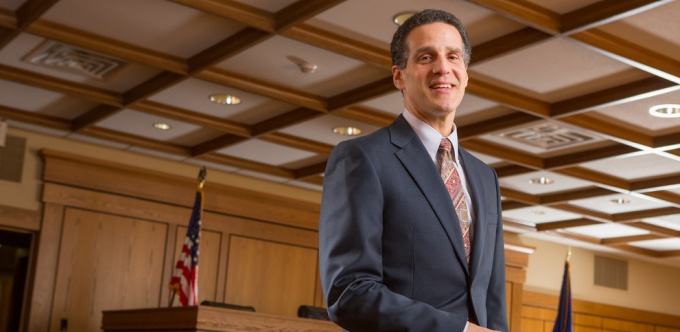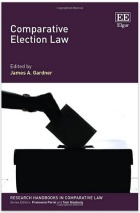
Democracy’s world of challenges
Prof. James A. Gardner’s new book on comparative election law
Published on the cusp of summer, Professor James A. Gardner’s extensive edited volume, Comparative Election Law, offers 24 essays and 544 pages on election laws in democratic nations. It’s an ambitious and far-reaching roundup of current thought on the state of the world’s democracies and the struggle to make self-governance work, one nation at a time.
Gardner, the Bridget and Thomas Black SUNY Distinguished Professor at UB School of Law, was commissioned by the U.K.-based publisher Edward Elgar Publishing to develop and shape the book as part of its Research Handbooks in Comparative Law series. He wrote an extensive introductory chapter and contributed his own essay on “Electoral Systems and Conceptions of Politics.” Also of note is “The Fraud of John Locke: Subnational Challenges to Democratic Theory,” an essay by his colleague, Makau Mutua, Margaret W. Wong SUNY Distinguished Professor.
“This is a fabulous book by one of the leading thinkers of law and democracy,” says one reviewer, Guy-Uriel Emmanuel Charles of Harvard Law School. “It fills a tremendous hole in the literature by emphasizing the importance of a comparative approach to helping us think anew about both old and new problems in law and democracy.”
In conversation, Gardner shares some thoughts on the subject and the ways different scholars wrestle with the challenge of making democratic rule a reality:
Your introduction speaks to two competing ideas of understanding democracy. Does one of these understandings win out in the book?
We’re talking about states that are democracies, that have already made that choice. How do you go about structuring your democracy and what practices do you adopt? There are two schools of thought. One is that democracy is democracy everywhere and there are best practices that can make it the best it can be. The other view is that there is no single model of democracy—that different societies might choose, or be constrained, to practice democracy in a particular way, based on their history or a set of different preferences. In that case, the best democracy is what’s best for that particular nation. Most scholars seem to take the first view.
The book looks at election law and practice around the world. How might those concerned with defending democratic rule in the United States benefit from these global perspectives?
It’s always a virtue to be curious, and it’s a virtue to satisfy one’s curiosity by looking at how others do things in general. It’s clear that our democracy is under enormous stress right now, and it could be extremely useful to Americans to look at how it’s practiced in other places to see if there are practices that could be less vulnerable.
By its nature, democracy is a messy and imperfect business. Is it even possible to create and maintain a smoothly operating system of self-governance?
That’s what populism is looking for. Populism is in many ways a reaction to the complexity of actual democratic systems. It seeks to erase that complexity by hypothesizing a single unified people who agree on everything, embodied by a leader who’s given free rein. That’s a fantasy. Actual democracy is messy and imperfect, and it’s tiring. What tends to gum up the works? One thing is people; another is just human stamina. Oscar Wilde explained why he’s not a socialist by saying, “It takes up too many evenings.” Democracy asks of its citizens more than any other form of government. They have to participate, they have to pay attention, they have to formulate opinions. That’s what self-rule is. And there’s a burden that goes with that.
Election administration is suddenly a hot-button political issue in the United States. Does your book offer any guidance for secretaries of state and local election officials?
It’s more geared to questions of system design, not to questions of what happens when your system design is deliberately thwarted. There is a chapter on election administration, on the way our system entrusts the administration of elections to people who have a partisan orientation, like elected secretaries of state who run on a party line. Nowhere else is this model emulated; in most places the ideal is thought to be a nonpartisan bureau of civil servants.
How were you hoping your authors would approach the topic?
My aim was to do more than a book that just says in chapter after chapter, here’s how we do it in State A, State B, State C. That’s part of what comparative law is about, but I asked the authors to dig a little deeper and address the question of why one society would choose to do things one way and another would choose to do them another way. What kind of values do they reflect? The ultimate goal is to explore the variety and forms of human flourishing. People don’t have to live the same way, and they don’t.
What exactly does the editor of a book like this do?
I solicited the contributions, and I thought very carefully about who among the people working in these various fields is more inclined to this deeper view that I wanted. I was particular about whom I invited. One approach to an edited volume is to get the best people and let them go, and that’s what I chose.
